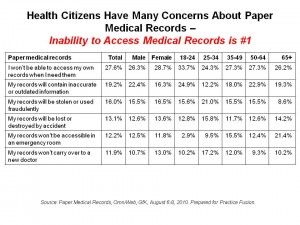 When it comes to their paper medical records, people are most concerned about their ability to access them when they need them. 28% of Americans are more concerned about access than inaccuracies, fraudulent use of the record, loss, or portability to a new doctor.
When it comes to their paper medical records, people are most concerned about their ability to access them when they need them. 28% of Americans are more concerned about access than inaccuracies, fraudulent use of the record, loss, or portability to a new doctor.
Practice Fusion commissioned this survey of American adults and how they feel about various aspects of paper-based medical records. Overall, 1 in 5 people worry about inaccuracies or outdated information in their records; 1 in 6 are concerned that records will be stolen or used fraudulently, and 1 in 10 fret that records will be lost, won’t be accessible in an emergency room, or won’t carry over to a new doctor.
Practice Fusion generously shared some additional survey data with me for Health Populi readers’ insights. If you examine the chart you’ll see data from the survey broken down by gender and age cohort. The sexes don’t disagree much on the concerns about paper-based medical records: a few more women are worried about inaccuracies and outdated information than men, but otherwise, the concerns are equally shared.
Interesting patterns emerge when looking at the data by age groups. For example, 25% more young people age 18-24 are worried about records being inaccurate or outdated — 1 in 4 – compared with the overall population. Older Americans age 65+ are less concerned about records theft and fraud, inaccuracies, and portability to new doctors (perhaps because they’ve been with doctors for a long time). On this last issue, ability to carry a record to a new doctor, more people age 25-34 are more concerned about that — perhaps because they’re beginning to shop around for physicians, and women are also in childbearing years.
Concerns about the ability to access medical records in the ER are highest among people 65 and over — 21% compared with 12.2% overall. That’s nearly double the national population. Older people seem highly sensitive to the possibility they’ll end up in an ER versus younger populations. In contrast, only 2.9% of people 18-24 are worried about not being able to access their health records in the emergency department.
This survey was conducted August 6-8, 2010, among 1,000 adults in the U.S., split evenly between men and women. The margin of error is +/- 3% for the full sample.
Health Populi’s Hot Points: When people are newly-diagnosed or in acute need of health care is the most important moment-of-truth for them when it comes to accessing personal health information. When that information is locked up in some way — whether literally in a hospital file room or figuratively due to an institution’s policies and procedures — a health citizen is instantly rendered dis-empowered.
And that health citizen’s fundamental right to pursuing “life, liberty and happiness” is expunged. This can be, in a word, frustrating…and sometimes, it can be a life-and-death scenario.
 As Regina Holliday has said, “Give me my damned data.”
As Regina Holliday has said, “Give me my damned data.”
Practice Fusion’s press release on the survey mentions Regina and Dave DeBronkart, two prominent uber-engaged patients who are energizing the Participatory Health movement. I’m privileged to know both of these individuals, and I recommend that you visit their blogs (linked to their names here) to get up-close-and-personal with why access to medical records for ourselves and our loved ones is so crucial.
More on Regina can be found here on Health Populi when I wrote about Regina and her husband, Fred, in the context of meaningful use and morality.




 Interviewed live on BNN Bloomberg (Canada) on the market for GLP-1 drugs for weight loss and their impact on both the health care system and consumer goods and services -- notably, food, nutrition, retail health, gyms, and other sectors.
Interviewed live on BNN Bloomberg (Canada) on the market for GLP-1 drugs for weight loss and their impact on both the health care system and consumer goods and services -- notably, food, nutrition, retail health, gyms, and other sectors. Thank you, Feedspot, for
Thank you, Feedspot, for  As you may know, I have been splitting work- and living-time between the U.S. and the E.U., most recently living in and working from Brussels. In the month of September 2024, I'll be splitting time between London and other parts of the U.K., and Italy where I'll be working with clients on consumer health, self-care and home care focused on food-as-medicine, digital health, business and scenario planning for the future...
As you may know, I have been splitting work- and living-time between the U.S. and the E.U., most recently living in and working from Brussels. In the month of September 2024, I'll be splitting time between London and other parts of the U.K., and Italy where I'll be working with clients on consumer health, self-care and home care focused on food-as-medicine, digital health, business and scenario planning for the future...